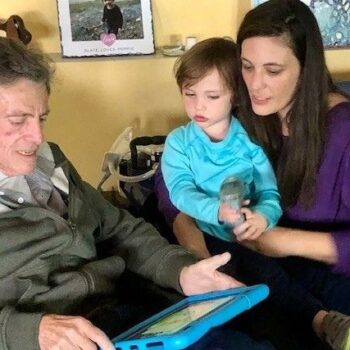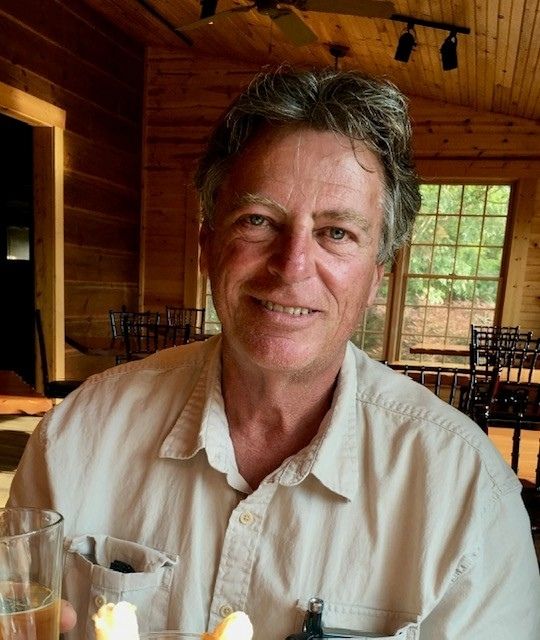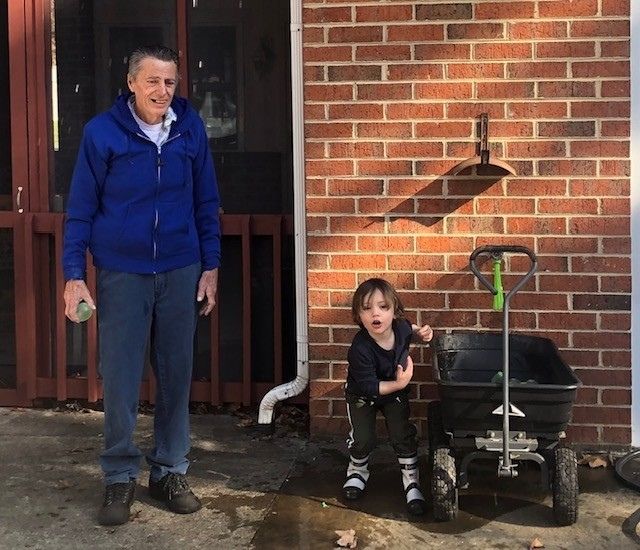The Small Caregiving Choices That Made a Big Difference

I believe that finding ways to preserve his identity, within reasonable boundaries, enriched his quality of life.
June 26, 2025
Jessica Buhler is the Corporate Director of Communications at The Kendal Corporation. A longtime Kendal team member and former caregiver to her father, she’s a working mom who enjoys nature, music, and time with her husband and young son, Slate.
When I was in a caregiving role for my father, Edward, who died from ALS and frontotemporal dementia in 2021, it was a heartbreaking time in my life, and I feel for anyone experiencing a similar story. Part of my healing is sharing the truth about it all. And, through that experience, I did learn some strategies and come to some understandings that I hope may be helpful for others.
Balancing safety with dignity
Dementia often requires caregivers to assume an assertive role, but maintaining the dignity and independence of a loved one is equally essential. I discovered small ways to honor who my father was. For instance, my dad was always a generous man who loved paying in cash. So, I arranged for him to be the one to withdraw money (thousands of dollars in cash) weekly from an ATM to pay his caregivers directly.
Though this may be seen as risky, it gave him a sense of purpose and autonomy. To ensure safety, I managed the funds in his account and coordinated with the caregivers to assist. But I believe that finding ways to preserve his identity, within reasonable boundaries, enriched his quality of life.
Connecting through unexpected ways
One way I was able to appreciate some unexpected joys came from observing the bond between my three-year-old son and my dad. They engaged in puzzles, coloring, and other activities, often connecting at a similar cognitive level. Their togetherness brought us all joy, even across different stages of life.
My father’s newfound playfulness, something that was rarer to see when I was growing up, was beautifully manifested during kitchen dance parties with him, my son, and me. These moments allowed us to find joy in the “new” version of him.

Navigating the challenges of safety vs. freedom
One of the most challenging aspects of caregiving was addressing my dad’s desire to drive his car. He had always enjoyed driving, and he was feeling trapped, but it became unsafe. When we took his car keys, he naturally resisted and often demanded them back. Not really knowing what to do, I thought to print a mock driving test, which his caregiver administered under the guise of being from the state. While he answered every question about operating the vehicle correctly, for the rules of the road, he did not get one right. Referring to this test, and having it printed out to show him, helped us provide an explanation for why he could no longer drive.
To help him not feel so cooped up, his caregivers took him on daily drives for one to two hours. Though it may be considered a “waste” of gas (and I felt bad about the extra emissions in the air), the drives were calming and brought him happiness. Moments like that are reminders that caregiving often involves making seemingly unconventional choices to preserve well-being.
The role of professional caregivers
Having caregivers in the home comes with its own dynamics. I learned that caregivers are invaluable, and they are also employees and require management, direction, and support. Occasionally, this involved tough decisions, like letting go of a caregiver who was always late. My experience in my career as both a manager and in the field of aging services was invaluable. I don’t think I would have been able to have my dad live with us and coordinate his care if I didn’t have those skills and depth of understanding.
Almost all nurses and doctors I came into contact with were helpful and understanding. Throughout all this my dad maintained his thick, salt and pepper hair and baby blue eyes, with many nurses commenting on how handsome he was despite him being quite frail. That always made him smile; and me too… He still had it!
Tools and small wins along the way
Throughout the time he lived with me, I sought many, many tools to enhance my dad’s daily life, from assistive devices to brain-stimulating activities. Some worked great, while others didn’t.
One thing that helped is that I put tape over all the remote-control buttons except “on” and “off”. He mostly liked watching one station anyway with fun shows that were not too intense (“Andy Griffith,” “Seinfeld,” and “Golden Girls”). I liked these too!

I wish we had a diagnosis earlier
My dad’s condition came amid enormous family loss, including the sudden passing of my mother in 2017 at age 64 and the awful death of my brother one month later.
Initially, we believed my father’s struggles were connected to grief or depression, thinking he had gone mad with a broken heart. His eventual diagnosis in 2020 of ALS and frontotemporal dementia provided clarity that I wish we had earlier on, as in the lead-up, he was taken advantage of emotionally and financially by a troubled woman who had no home or money of her own. Amid the grief and disarray, we could tell he was making poor decisions, but now I know better why.
Advice for caregivers
Watching someone you love lose abilities piece by piece is heartbreaking. Here is some advice for fellow caregivers I can share.
- Find moments of joy: While dementia changes loved ones, it may also bring glimpses of unexpected joy. Whether through dancing or other shared activities that may be new to the relationship, these moments can be good ones.
- Preserve their identity: Honor who your loved one is by finding safe ways for them to engage in activities that reflect their personality and values.
- Accept help and build a team: Whether it’s professional caregivers or family members, surrounding yourself with support eases the burden and provides better care. It does not come without a lot of effort.
- Prepare for emotional decisions: Addressing safety concerns like driving or finances is difficult. Approach these decisions with empathy and creativity, keeping their dignity in focus.
Building personal strength
While I was experiencing these losses and tragic moments, I tried to honor that pain we all went through and focus on how it could make me a stronger, more loving person. I work harder now to be my true authentic self, not be afraid to make hard decisions, and live my life to the fullest. In this way, I believe I’m honoring the memory of those I lost and my father’s journey.